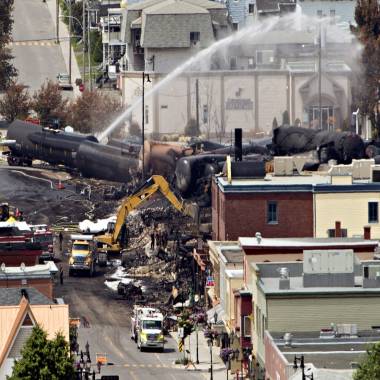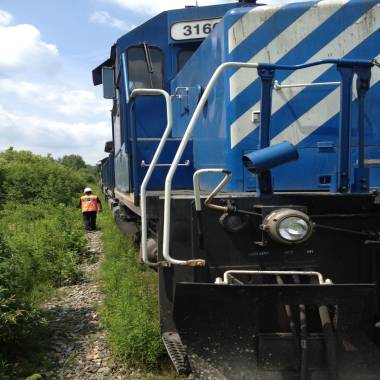Searchers are on the hunt for 50 people who are still missing after an oil train derailed in Quebec, killing at least 13 people.
By Benjamin Shingler and Rob Gillies, The Associated Press
LAC-MEGANTIC, Quebec -- Investigators searching for the cause of a runaway oil train derailment that wiped out a small town's center, killing at least 13 people, zeroed in on an earlier blaze on the train where it had been parked overnight.
Officials are focusing on the possibility that action taken during the earlier fire, which was quickly extinguished, might have led to the release of the brakes several hours later.
Inspectors, meanwhile, searched for remains in the derailment's devastated epicenter after finally being cleared to enter the area late Monday ? almost three days after the disaster. A total of 50 people were missing, including the 13 unidentified victims, and the death toll was sure to rise.
The rail tankers that blew up had a history of puncturing during accidents, but investigators acknowledged that it was too soon to tell whether that had been a factor in the explosions.
All but one of the train's 73 cars was carrying oil. At least five of the train's tankers exploded after coming loose, speeding downhill nearly seven miles and derailing in the town of Lac-Megantic, near the Maine border.

Ryan Remiorz / The Canadian Press via AP
Searchers dig through the rubble for victims of the inferno in Lac-Megantic, Quebec, on Monday.
Maude Verrault, a waitress at downtown's Musi-Cafe, was outside smoking when she spotted the blazing train barreling toward her.
"I've never seen a train moving so fast in my life, and I saw flames ... Then someone screamed 'the train is going to derail!' and that's when I ran," Verrault said. She said she felt the heat scorch her back as she ran from the explosion, but was too terrified to look back.
The rail tankers involved in the derailment are known as DOT-111 and have a history of puncturing during accidents, the lead Transportation Safety Board investigator told The Associated Press in a telephone interview late Monday.
TSB investigator Donald Ross said Canada's TSB has gone on record saying that it would like to see improvements on these tankers, though he said it was too soon to know whether a different or modified tanker would have avoided last weekend's tragedy.
The DOT-111 is a staple of the American freight rail fleet. But its flaws have been noted as far back as a 1991 safety study. Among other things, its steel shell is too thin to resist puncturing in accidents, which almost guarantees the car will tear open in an accident, potentially spilling cargo that could catch fire, explode or contaminate the environment.
"It's too early to tell. There's a lot of factors involved," Ross said. "There's a lot of energy here. The train came down on a fairly significant grade for 6.8 miles before it came into the town and did all the destruction it did." He said the train was moving at 63 mph when it derailed.

Transportation Safety Board of Canada / handout
Handout image released Monday by the Transportation Safety Board of Canada showing the an investigator looking over a locomotive in the train involved in the derailment and fire in Lac Megantic.
Officials were also looking at a locomotive blaze on the same train in a nearby town a few hours before the derailment. Ross also said the locomotive's black box has been recovered, and investigators were examining whether the air brakes or the hand brake malfunctioned.
"The extent to which (the fire) played into the sequences of events is a focal point of our investigation," Ross said.
The derailment raised questions about the safety of Canada's growing practice of transporting oil by train, and was sure to bolster arguments that a proposed oil pipeline running from Canada across the U.S. ? one that Canadian officials badly want ? would be safer.
Raymond Lafontaine, whose son and two daughters-in-law were among the missing, said he was angry with what appeared to be a lack of safety regulations.
"We always wait until there's a big accident to change things," he said. "Well, today we've had a big accident, it's one of the biggest ever in Canada."
A runaway train filled with crude oil derailed in the town of ?Lac-Megantic, where at least 40 buildings were destroyed when five of the train cars exploded. NBC's Katy Tur reports.
The area remained part of a criminal probe and investigators were exploring all options, including the possibility that someone intentionally tampered with the train, said Quebec provincial police Sgt. Benoit Richard.
Local fire chief Denis Lauzon said firefighters in the nearby town of Nantes, uphill from Lac-Megantic, were called to handle a locomotive blaze on the train a few hours before the derailment, where it had been parked overnight.
Joe McGonigle, vice-president of marketing at the train?s owners, Montreal, Maine & Atlantic Railway, said the earlier fire was reported after an engineer secured the train and gone to a local hotel.
"We know that one of our employees from our engineering department showed up at the same time to assist the fire department. Exactly what they did is being investigated so the engineer wasn't the last man to touch that train, we know that, but we're not sure what happened," McGonigle said.
Nantes Fire Chief Patrick Lambert said that when his crew intervened, the engine was shut off per the standard operating procedure dictated by Montreal, Maine & Atlantic Railway. The blaze was extinguished within about 45 minutes. And that's where the fire department's involvement ended, Lambert said.
"The people from MMA told us, 'That's great ? the train is secure, there's no more fire, there's nothing anymore, there's no more danger,'" Lambert told reporters. "We were given our leave, and we left."
Ed Burkhardt, president and CEO of the railway's parent company Rail World, Inc., suggested that the decision to shut off the locomotive to put out the fire might have disabled the brakes. "An hour or so after the locomotive was shut down, the train rolled away," Burkhardt told CBC.
Meanwhile, crews were working to contain 27,000 gallons of light crude that spilled from the tankers and made its way into nearby waterways. There were fears it could flow into the St. Lawrence River all the way to Quebec City.
Quebec's Environment Ministry Spokesman Eric Cardinal said officials remained hopeful they could contain more than 85 per cent of the spill.
Related:
This story was originally published on Tue Jul 9, 2013 7:44 AM EDT
? 2013 The Associated Press. All rights reserved. This material may not be published, broadcast, rewritten or redistributed.
eli young band wrestlemania country music awards 2012 wrestlemania 28 results earl scruggs wrestlemania 28 game of thrones season 2
No comments:
Post a Comment
Note: Only a member of this blog may post a comment.